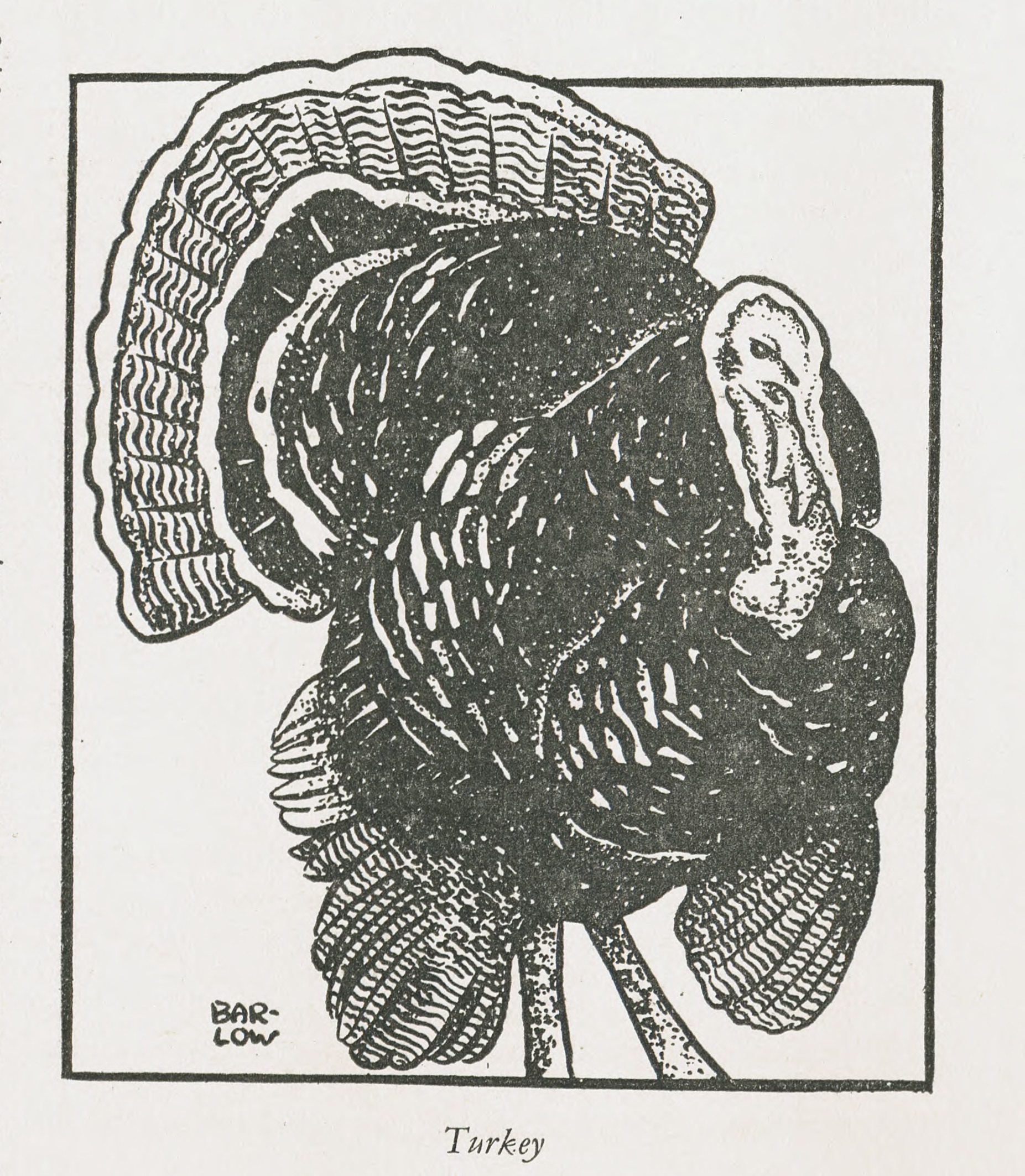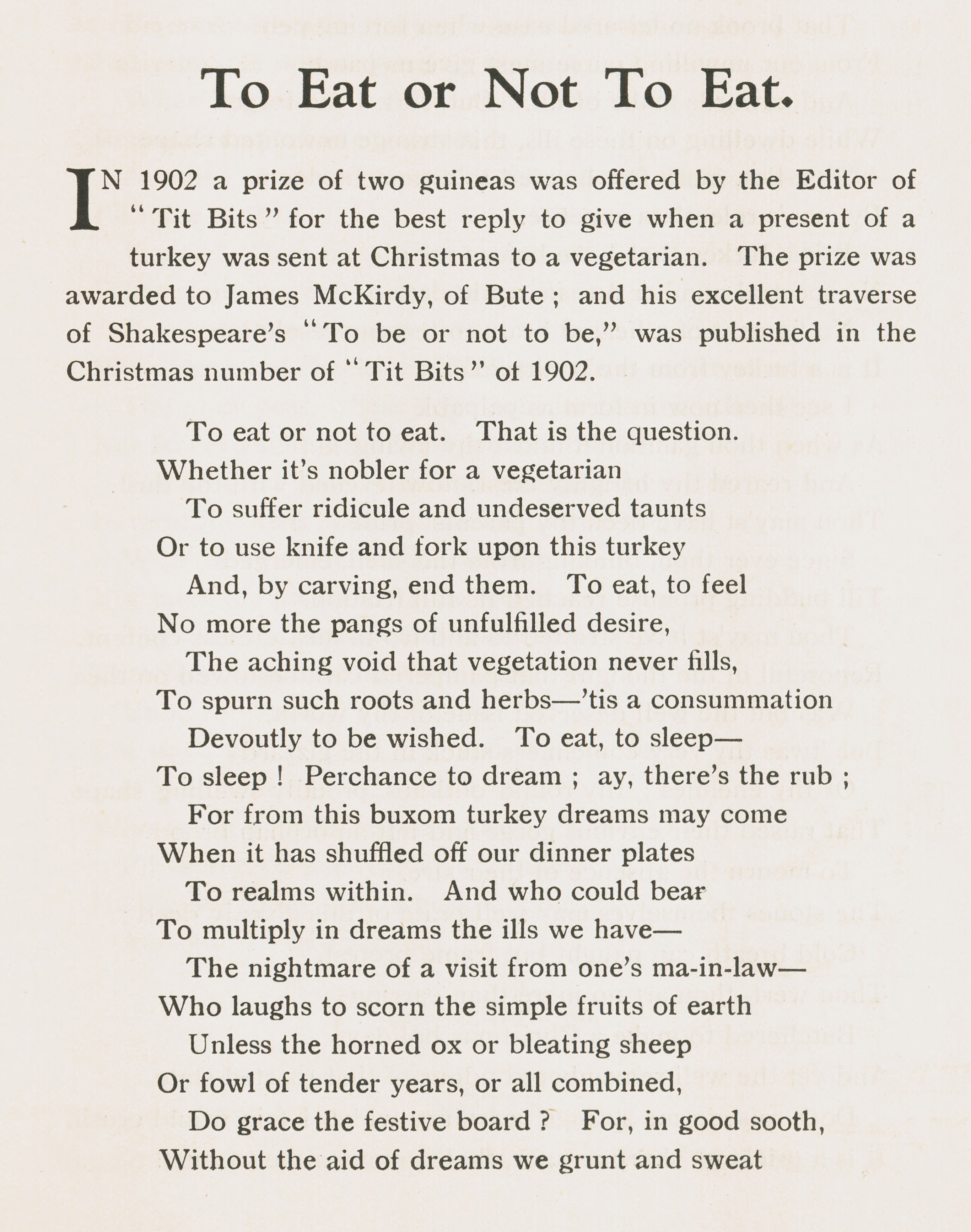
Turkey day or tofurkey day?
November isn’t just about Thanksgiving, it’s also World Vegan Month! As we've been scanning materials for the Animal Turn project, we've uncovered some pamphlets that address the topic of meatless diets. So I thought this month would be a good time to bring those to light. According to a recent Gallup poll, 5% of the U.S. population identifies as vegetarian, and 3% identifies as vegan. While the history of meatless diets goes back over 2,000 years, particularly in India, it’s a relatively modern phenomenon in the U.S. and the U.K., usually associated with the animal rights and animal welfare movements. Since the Libraries has recently published materials from the Animal Rights and Animal Welfare Pamphlets collection that deal with meatless diets, I thought it would be interesting to highlight one of those pamphlets as we all put on our elastic waist pants to prepare for our Thanksgiving feasts.
Many of our digitized materials that deal with vegetarianism idealize a world in which no one ever eats meat. In the pamphlet,"Some social results of the meatless diet" Ernest A. Bell discusses the changes that he believed society would undergo if we all adopted vegetarian or vegan diet. For instance, Bell describes how our ways of speaking might change in a completely meatless world.
Our language, as everyone knows, is a tell-tale witness of past history, and its barbarities will need much expurgation. When vegetarianism reigns in the land we shall not abuse people by calling them "silly as sheep" or as "fat as pigs," for instance. We shall then know the sheep and the pig only in their natural states, where the one is a skilful and sagacious mountain climber and the other a well-proportioned athlete, who can clear a five-barred gate.
According to Bell, even idioms and phrases that many of us use daily would be different if we were all vegetarian or vegan.
Our proverbs, too, which are held to store up the wisdom of the past, will call for revision. Imagine really refined people expressing themselves by saying, "The nearer the bone the sweeter the meat”is it not horrid? Or how can one imagine anyone but a barbarian talking of killing two birds with one stone? To "spur" one on to further exertion will become a tell-tale expression of the present barbarous times. Again, how distressing it is to hear a gentle young lady telling you that all her plans for a holiday were "knocked on the head” a simile evidently taken from the slaughter-house. A "bone of contention," again, is not a nice thing, and in real vegetarian days we shall be quite content then with an "apple of discord." Whether in those days we shall still be as much addicted to over-eating that our favourite method of expressing that we are tired of anything is that we are "fed up with it" as at present is the case. I dare not prophesy, but I hope not.
It’s worth pointing out, also, that Bell’s arguments for vegetarianism are actually arguments for veganism. He discusses in the same pamphlet the use (and avoidance) of materials made from animal skins, hair, and other animal byproducts. Today, we have lots of options--both animal- and plant-based--to fit every taste and every palate. But that wasn’t the case in the early 1920s, when this pamphlet was published. In the days before synthetic leathers, fibers, and adhesives were invented, it was very difficult for people to adopt a fully vegan lifestyle.
In closing, I’ll leave you with an excerpt from poem written in 1902 by James McKirdy as part of a contest to write a vegetarian’s response to being given a turkey as a gift. The literarily minded among you will notice that Mr. McKirdy took his inspiration from Hamlet’s famous (and agonized) soliloquy. If you're interested in reading the whole poem, it was published as part of Humane Life, vol. 3, no. 2 (1937).
To eat or not to eat. That is the question. Whether it's nobler for a vegetarian To suffer ridicule and undeserved taunts Or to use knife and fork upon this turkey And, by carving, end them.
Whether your Thanksgiving table is laden with turkey or tofurkey, the SCRC wishes you a very happy Thanksgiving!
The resources highlighted in this post, and many more digital resources from the Animal Turn project, are available in the Libraries Rare and Unique Digital Collections, which provides access to over a million images, drawings, video, audio recordings, and textual materials documenting NC State history and other topics.


